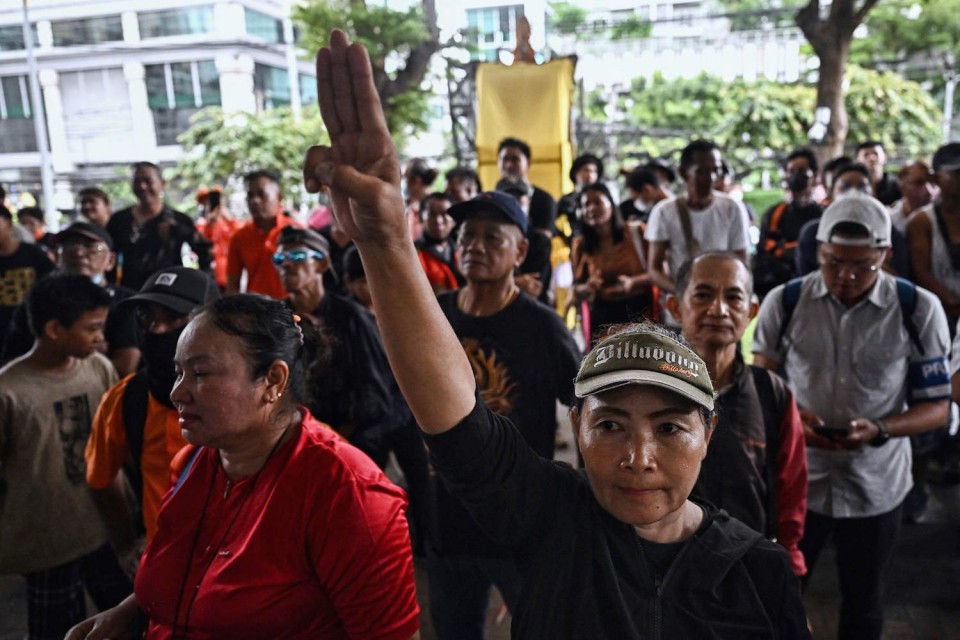
BANGKOK, Aug 2, 2023 (AFP) – The reformist party that won Thailand’s general election was excluded Wednesday from a coalition trying to form the next government, as lawmakers seek to overcome resistance from military and pro-royalist senators.
The Move Forward Party (MFP) won the most seats in May’s election, riding a wave of support from young and urban Thais weary of almost a decade of army-backed rule, but it fell well short of a majority.
An eight-party coalition including MFP’s closest rival, Pheu Thai, was not enough to get its leader Pita Limjaroenrat elected prime minister, leaving the kingdom in political deadlock.
Harvard-educated Pita, 42, was blocked from the top job by the senate — whose members were handpicked by the last junta — because of his determination to reform Thailand’s tough royal defamation laws.
After weeks of backroom haggling, Pheu Thai leader Chonlanan Srikaew announced that MFP was out of the coalition.
“The formation of the new government will not include MFP,” he told reporters.
“Pheu Thai will work to get enough votes, MFP will be in opposition, and we will work in a new dimension that is beneficial to the people.”
The news sparked an angry protest by some MFP supporters, who burned effigies and shouted abuse outside Pheu Thai’s offices.
MFP secretary general Chaitawat Tulanon gave a more measured response, saying the party would try to push its policies even from the opposition benches.
“We will do our best to restore Thai politics to a true democracy — a system in which people’s votes really matter,” he told reporters.
– Tycoon nominated –
Pheu Thai will now put forward property tycoon Srettha Thavisin as its candidate to become prime minister, Chonlanan said.
To become prime minister, a candidate must be approved by a majority of both houses of parliament — the 500 elected MPs and the 250 senators appointed under the last junta.
Pita managed 324 votes across the two houses in the first vote in parliament, with only 13 senators supporting him.
He was blocked from running in a second ballot and suspended as an MP by the Constitutional Court over his ownership of media shares, which is prohibited for lawmakers under Thai law.
Last month, MFP announced it was stepping back from efforts to form a government, allowing Pheu Thai to lead the coalition instead.
A senior MFP leader said the priority was not to make Pita prime minister but to safeguard Thai democracy by shutting out former junta leaders such as outgoing PM Prayut Chan-O-Cha.
Pheu Thai is seen as a vehicle for the Shinawatra political family, whose members include two former prime ministers ousted by military coups.
Clan patriarch Thaksin Shinawatra, deposed as PM by the army in 2006, is to return to the kingdom next week after 15 years in self-exile to avoid criminal charges he says are politically motivated.
– Uncertain outcome –
Talks aimed at garnering more support for the coalition from other parties revealed that MFP’s insistence on lese-majeste reform was a major stumbling block, Chonlanan said.
“Several parties have made it clear that they will not support any government with MFP in the coalition,” he said.
As well as royal defamation reform, MFP also spooked the Thai establishment with pledges to reform the military and break up business monopolies that dominate the kingdom’s economy.
Political analyst Thitinan Pongsudhirak said once Pita lost the PM vote it was “only a matter of time” before Pheu Thai jettisoned MFP.
“At issue now is whether MFP will still support a Pheu Thai PM candidate to marginalise the senate,” Thitinan told AFP.
“If so, it would be a snub to the coupmakers.”
Another vote to choose a PM is slated for Friday, but it is not certain to go ahead.
The Constitutional Court is due to announce on Thursday whether it will hear a petition challenging parliament’s decision to deny Pita a second ballot to become prime minister.
If Friday’s vote does go ahead, without MFP’s 151 lower house seats Srettha will need to seek support from other parties — possibly including the Bhumjaithai party which was part of the outgoing government.







